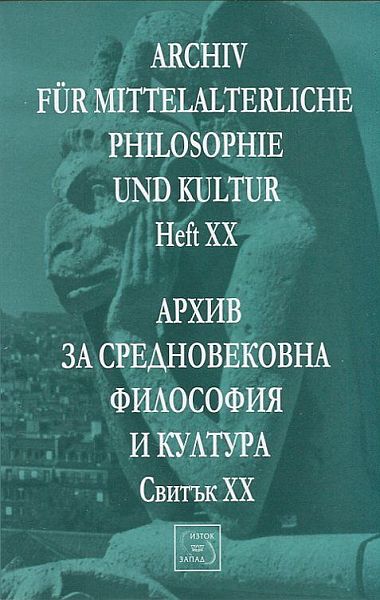Gregory Nazianzen: Sceptic or anti-Sceptic?
Gregory Nazianzen: Sceptic or anti-Sceptic?
Author(s): John A. DemetracopoulosSubject(s): Ancient Philosphy, Philosophy of Middle Ages, Philosophy of Religion, Systematic Theology
Published by: Издателство »Изток-Запад«
Keywords: Byzantine philosophy; Gregory Nazianzen; Pyrrho; Sextus Empiricus; Skepticism; Christian theology
Summary/Abstract: According to the traditional interpretation of Gregory Nazianzen’s (329/330–390 AD) references to the names of Pyrrho and Sextus Empiricus (Oration XXI, 17; Oration XXXII 25; Carmina moralia X; Carmina de seipso V, 303–305), Gregory was an enemy of Scepticism. Yet, Gregory does not refer literally to Pyrrho and Sextus, but speaks metonymically of some “Sextuses and Pyrrhos” who invaded Christian theology, by which he means some Christian theologians whose way of arguing exhibited similarities with Sextus’ and Pyrrho’s method, namely, the Eunomeans, whose fundamental fault was, to him, their contradictory spirit, allegedly represented par excellence by those philosophers. Gregory’s stance to Scepticism was theological and pastoral, not philosophical in tenor. This stance was eclectic. On the one hand, he was annoyed by the obstinacy of the Neo-Arianists. He was also troubled by some persons who vindicated for themselves the right to make their own choice in the religious matters and paid no homage to any person or institution; this, to Gregory, would result in lacking any doctrinal belief, which is the fundamental defect of Ephectic Scepticism. Both groups, if gaining ground, would turn the hierarchical model of the ecclesiastical government into anarchy. On the other hand, Gregory was aware of the doctrinal anarchy among philosophers, which was described and exploited (for Sceptical purposes) in Sextus’ writings. Anarchy amongst the best postlapsarian spirits, Gregory thought, shows that, in this life, man is unable to find the truth by means of his own potential. Thus, one must place oneself under the guidance of the God-sent doctrine of the Church.
Journal: Архив за средновековна философия и култура
- Issue Year: 2014
- Issue No: 20
- Page Range: 116-143
- Page Count: 28
- Language: English, Greek, Ancient (to 1453)
- Content File-PDF

